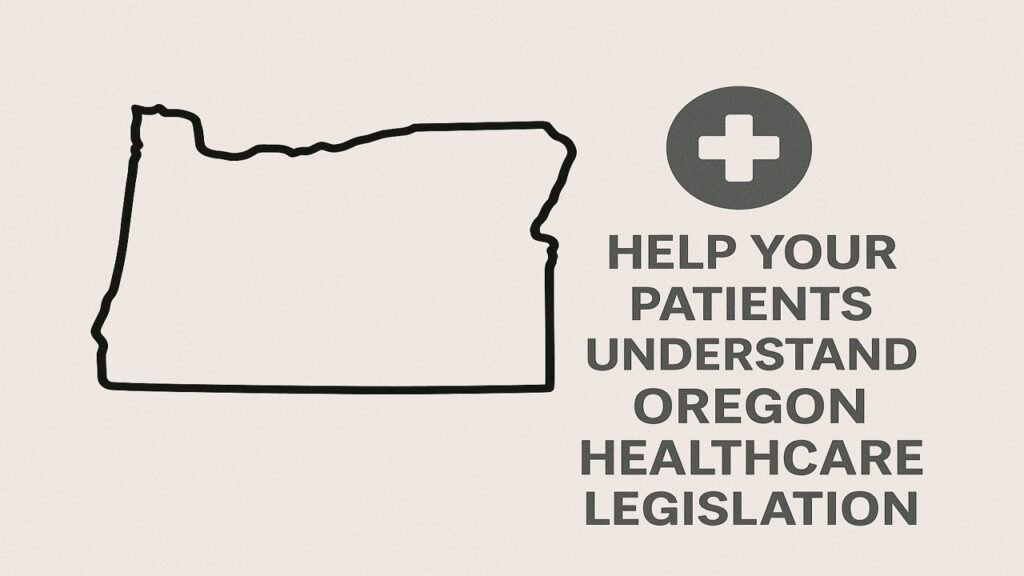Oregon Healthcare Legislation: What HB 3242 & HB 2540 Mean for Providers & Patients
If you haven’t followed Oregon healthcare legislation lately, now’s the time to tune in. Two major new laws — House Bill 3242 and House Bill 2540 — could reshape healthcare access and affordability in Oregon, and potentially inspire similar reforms nationwide. Let’s break them down.
Key Takeaways
- Oregon healthcare legislation introduces two major reforms: HB 3242 and HB 2540.
- HB 3242 allows providers in credentialing to bill at in-network rates for 90 days.
- HB 2540 lets patients apply certain out-of-pocket costs to deductibles, even out-of-network.
- These changes aim to reduce care delays and ease patient financial strain.
- Other states may adopt similar laws — healthcare providers should monitor trends closely.
Oregon House Bill 3242: A Huge Win for Providers (With a Catch)
First up, let’s talk about Oregon House Bill 3242. The governor signed this into law just a few weeks ago, and it’s a pretty big deal for healthcare providers.
Here’s what this part of Oregon healthcare legislation does: it allows providers who are in the credentialing process with an insurance network to start seeing patients at in-network reimbursement rates — even before they’re fully credentialed.
Yep, you heard that right.
Right now, if a provider is going through credentialing, they typically can’t see patients unless the patient has out-of-network benefits or agrees to self-pay. Under this new law, during the 90-day credentialing process, providers can bill and be paid at in-network rates.
This is a game changer for practices.
But of course, there’s a catch. If the provider fails the credentialing process, the group or individual provider will have to pay back all the money received during that time.
And what if the insurance company denies them not because they failed, but because the network is closed? Good question — that part isn’t 100% clear.
Bottom line: it’s a bit of a gamble. You’ll want to do your due diligence before adding any new providers under this new Oregon healthcare legislation.
Why This Is Exciting for Practices
If you’re hiring someone with a great reputation — no legal issues, no malpractice claims — this is fantastic news.
It eliminates the long waiting periods where new hires can’t see patients, which often puts unnecessary strain on small practices.
It also ensures continuity of care and faster onboarding, which is a big win for both patients and providers.
If you run a practice in Oregon, this part of Oregon healthcare legislation is absolutely worth diving into.
Here’s a quick table summarizing the pros and cons:
| Pros | Cons |
|---|---|
| Allows new providers to see patients sooner | Risk of having to pay back insurance if credentialing fails |
| Revenue starts flowing faster | Possible ambiguity if network is closed |
| Reduces delays in patient care | Requires extra due diligence when hiring |
Stay Tuned…
That’s just the first bill. The second piece of Oregon healthcare legislation — House Bill 2540 — is just as interesting, and it affects patients’ out-of-pocket costs in a big way.
Oregon Healthcare Legislation: How House Bill 2540 Impacts Patients’ Out-of-Pocket Costs

Now for the second major update in Oregon healthcare legislation — House Bill 2540.
This one’s all about helping patients when it comes to those dreaded out-of-pocket costs. It’s not as flashy as the credentialing bill, but trust me, it could be a game changer for a lot of people.
Here’s what it does: it allows patients to apply certain out-of-pocket payments toward their deductible and out-of-pocket maximums — even when seeing an out-of-network provider.
Sounds simple, but of course, there are rules (because it’s Oregon healthcare legislation, after all!).
Related: Understanding Patient Out-of-Pocket Maximums: What You Need to Know
The Rules You Need to Know
For a patient’s out-of-pocket payment to count under this new Oregon healthcare legislation, the following must be true:
The service must be medically necessary and well-documented.
It must be a covered service by the patient’s insurance.
There can’t be a formal claim submitted to the insurance company for the service.
The amount paid by the patient must be less than the average discounted (allowable) rate for that service if billed in-network.
The patient must submit detailed paperwork — an itemized invoice, proof of payment, and probably more — to a dedicated entity in order to receive the credit.
Why It Matters
This part of Oregon healthcare legislation is likely aimed at patients who prefer to see an out-of-network doctor but don’t have out-of-network benefits. In those cases, they usually end up as self-pay patients — meaning none of what they pay counts toward their plan’s deductible or out-of-pocket max.
Under this bill, they can get credit for those payments, which is huge.
A lot of people pay thousands in premiums and still face situations where their preferred doctor is out-of-network. This law gives them more flexibility — and a little financial relief — when that happens.
Will It Catch On?
Honestly, this might not be used as often as the creators of the bill hope. Why? Because it puts a lot of the burden on the patient to gather paperwork, submit forms, and jump through hoops.
And let’s face it — most patients (and even many practices) might not know this new Oregon healthcare legislation exists, at least at first.
But if you run a practice in Oregon and you have a lot of self-pay patients — especially those who are paying because they lack out-of-network benefits — this is worth paying close attention to.
Here’s a quick breakdown of the potential impact:
| Benefit to Patients | Potential Challenges |
|---|---|
| Out-of-pocket payments may now count toward deductible | Patients must do extra paperwork |
| More choice in seeing out-of-network doctors | Not widely known yet |
| Financial relief for high-premium plans | Requires coordination between practice and patient |
Why Oregon Healthcare Legislation Might Set a National Trend
Here’s the thing: Oregon healthcare legislation might seem like “just Oregon” — but if history has shown us anything, healthcare laws that start at the state level often catch on elsewhere.
Think about it: how many times have we seen one state test out a new policy, and suddenly other states start looking at it too?
That’s exactly why you should be keeping an eye on these recent changes in Oregon healthcare legislation — whether you practice in Oregon or not.
Why Other States Will Be Watching Oregon Healthcare Legislation
Both House Bill 3242 (about credentialing and in-network payments) and House Bill 2540 (about out-of-pocket costs) are addressing real, widespread pain points in the U.S. healthcare system.
Delays in credentialing are a nightmare everywhere — not just in Oregon. Every state has providers who are forced to wait 90-120 days before seeing patients, which frustrates both practices and patients.
Out-of-pocket costs are skyrocketing everywhere too. Giving patients more flexibility in how those payments count toward their plans is the kind of consumer-friendly move that a lot of legislatures love to champion.
So it’s not hard to imagine other states looking at Oregon healthcare legislation and thinking, “Hey, maybe we should do that too.”
What Providers Should Do Next
If you’re practicing anywhere in the U.S., this is your cue to start watching for similar bills in your state legislature.
Follow your local medical association.
Monitor healthcare committee updates.
Talk to your credentialing teams and billing teams — because if these Oregon healthcare legislation ideas spread, they will directly impact your workflows.
And if you are in Oregon? Now’s the time to really dig into the details of these new laws. Understand the risks. Train your staff. Update your patient communications. Be ready.
How to Stay Proactive with Oregon Healthcare Legislation (And Beyond)
By now, you can see just how impactful Oregon healthcare legislation is becoming — not only for Oregon-based practices, but potentially for healthcare nationwide.
So how can you stay ahead of the curve? Here’s what to focus on:
Stay Updated on Oregon Healthcare Legislation
Laws like these evolve fast. A bill is signed, but then clarifying rules get published later. Dates change. Enforcement guidelines appear.
If you’re in Oregon, you need to be tracking updates to Oregon healthcare legislation regularly — through your state’s health authority, your medical board, or trusted healthcare news sources.
If you’re outside Oregon, keep tabs on your own state legislature. We could easily see similar bills introduced elsewhere over the next year or two.
Train Your Team on Oregon Healthcare Legislation
If you’re in Oregon, your front office, billing staff, and credentialing team should all know what Oregon healthcare legislation now allows.
For example, if a new hire is seeing patients during their credentialing period, your staff needs to know how to handle that billing correctly.
Likewise, if patients start asking about applying out-of-pocket payments toward their deductible, your team should understand what documentation is required.
A little upfront training can save a ton of confusion later.
Help Your Patients Understand Oregon Healthcare Legislation

These new changes in Oregon healthcare legislation can really benefit patients — but only if they know about them!
Don’t be afraid to post an FAQ on your website or talk about it during check-in or billing conversations.
For example, patients who’ve been paying out-of-pocket for years might be thrilled to hear they can now apply those payments toward their deductible — but they won’t know unless you tell them.
Keep Watching for National Trends
As we’ve said throughout this post, Oregon healthcare legislation might be a preview of what’s coming nationally.
With so much attention on healthcare affordability, access, and efficiency, other states could very well adopt similar measures soon.
By staying informed and preparing now, you’ll be ahead of the curve — and your practice will be ready to adapt quickly if (or when!) your state follows Oregon’s lead.
FAQ About Oregon Healthcare Legislation
What is Oregon House Bill 3242?
Oregon House Bill 3242 allows healthcare providers in the credentialing process to bill at in-network rates during the first 90 days. This part of Oregon healthcare legislation is designed to reduce care delays, streamline practice revenue, and help patients access care faster while providers await credentialing approval.
What happens if a provider fails credentialing under Oregon healthcare legislation?
If a provider fails the credentialing process under Oregon healthcare legislation, they or their group must pay back any money received from insurance during that interim period. It’s a calculated risk, so practices should conduct thorough due diligence before billing under this provision of the law.
What is Oregon House Bill 2540?
Oregon House Bill 2540 allows patients to apply certain out-of-pocket payments toward their insurance deductible and out-of-pocket max — even when seeing out-of-network providers. This Oregon healthcare legislation gives patients more financial flexibility, but it requires submitting detailed paperwork for eligibility and approval.
Do patients need to submit paperwork for House Bill 2540?
Yes. Oregon healthcare legislation requires patients to submit an itemized invoice and supporting documents to have out-of-pocket payments credited. Practices should help patients understand what’s needed, as this process can be time-consuming and confusing without proper guidance or communication.
Will other states adopt similar healthcare legislation?
It’s very likely. Oregon healthcare legislation often serves as a testing ground for policies that could spread nationwide. Given that both House Bill 3242 and House Bill 2540 address common pain points in healthcare, other states are already watching to see if they should introduce similar bills.
Final Thoughts on Oregon Healthcare Legislation
The recent changes in Oregon healthcare legislation — House Bill 3242 and House Bill 2540 — mark an exciting shift for both healthcare providers and patients. From allowing providers to bill at in-network rates during credentialing to giving patients credit for out-of-pocket payments, Oregon is tackling real-world healthcare challenges head-on.
These laws could easily set the stage for similar reforms across the U.S. That’s why understanding Oregon healthcare legislation now puts you miles ahead — whether you run a practice, manage billing, or advocate for patients.
By reading this blog post, you’ve gained a clear understanding of how these legislative changes work, what the risks and opportunities are, and how they could impact your practice or your care decisions. You’re now empowered to stay proactive, train your team, and prepare for the ripple effects that may spread well beyond Oregon.
And as healthcare legislation continues to evolve, you’ll be ready to adapt, lead, and serve your patients with confidence.
